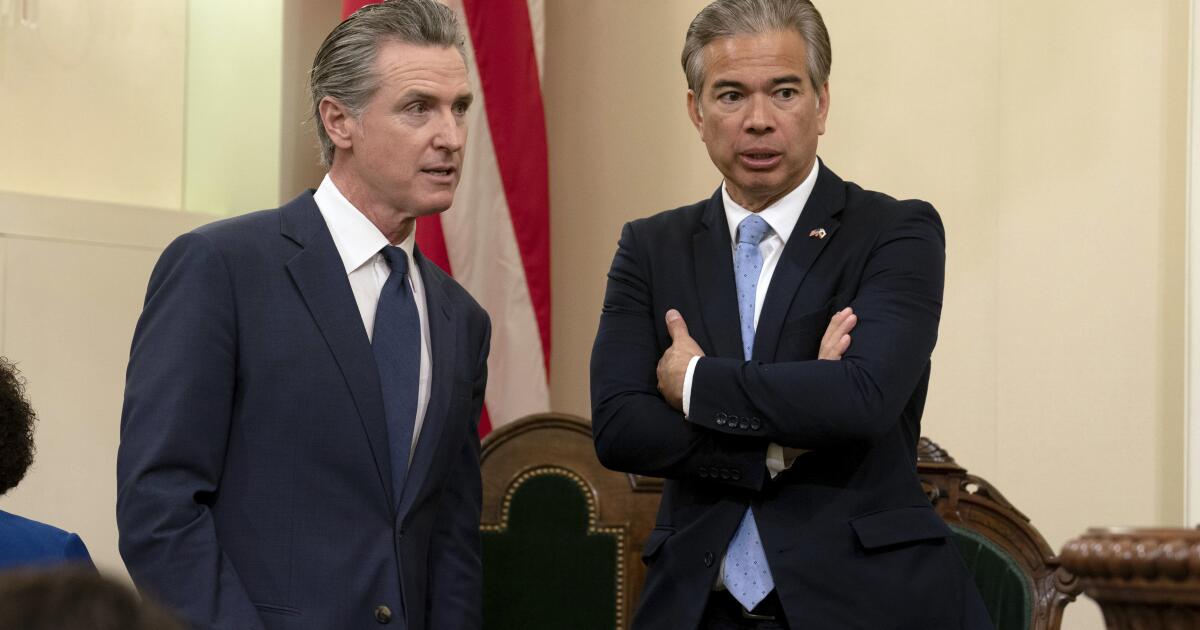Ahead of Trump’s second term, California vows to ‘ironclad’ abortion access

SACRAMENTO – California lawmakers are rushing to introduce legislation reaffirming the state’s role as a “reproductive rights” haven as President-elect Donald Trump prepares to return to the White House and abortion rights advocates warn of an uncertain future.
Abortion remains legal in California, home to the strongest reproductive rights in the nation – unlike in other states, there is no waiting period required or counseling before the procedure, and children can get abortions without parental involvement. In 2022, voters enshrined access to abortion in the state constitution after the US Supreme Court overturned the state’s right, limiting access to health care for millions of women.
But as Trump prepares to take the White House again, California’s Democratic leaders insist that not enough is being done to protect reproductive access in the event of a federal backsliding.
“The truth is, this is an emergency and a dangerous situation,” California Atty. Gen. Rob Bonta said at a press conference in Sacramento on Monday, pointing to renewed legal challenges over the distribution of abortion pills. “Right-wing extremists continue to attack after attack on our independence, harming the health and well-being of pregnant women.”
Bonta, a Democrat, said the new legislative proposals would make reproductive rights in California “ironclad.”
The focus of Gov. Gavin Newsom’s earlier push for abortion rights after Trump’s first term — including ad campaigns in red states — has drawn criticism from California Republicans who question his national political motives and praise from advocates who say it’s better to be safe than sorry. Although he has signed a number of bills strengthening access to abortion in recent years, some of his plans have been seen as more bright than happy. A temporary law allowing doctors licensed in Arizona to provide abortions in California, for example, has expired without doctors using it.
“He makes big announcements, but he’s not a good architect of those policies,” said Assembly Republican Leader James Gallagher of Yuba City. “It’s kind of his MO, to make a big splash and then nothing comes of it.”
Democrats, however, see a need to strengthen access to abortion given the uncertainty of Trump’s plans. A bill introduced this week aims to ensure the availability of mifepristone and misoprostol – a commonly used two-step abortion procedure – even if the Trump administration tries to interfere.
At issue is how anti-abortion government officials might revise and interpret the Comstock Act, a federal law that once banned the posting of “obscene” material related to abortion.
Although Trump has said he has no plans to ban abortion nationwide, he has repeatedly addressed the issue and took credit for appointing Supreme Court justices who challenged the state’s right to abortion in their landmark Dobbs case.
Reproductive health advocates are concerned that under his second term, the US Food and Drug Administration could restrict access to abortion pills. To lead the FDA, Trump has tapped Dr. Marty Makary, who has delivered anti-abortion messages on Fox News about fetal pain – something disputed by major medical organizations.
A California bill authored by former Planned Parenthood advocate and legislative newcomer Assemblymember Maggy Krell (D-Sacramento) aims to ensure that Californians continue to have access to medical abortion for the foreseeable future and protects “manufacturers, distributors, licensed health care providers and individuals” from any . legal action for distributing or giving pills.
“There are emerging threats to the availability of mifepristone and misoprostol, and California may not be able to ensure continued supply,” the bill states. “In the past, Governor Newsom has implemented a program to collect doses of misoprostol. Despite the success of this effort, the Legislature finds that the state needs to renew its stock to ensure that Californians can continue to exercise their constitutional rights.”
Last year, Newsom rushed to collect hundreds of thousands of abortion pills after a Texas judge decided against approval of medicine.
“We will not allow the extremists who try to close these serious abortion programs. Medical abortion remains legal in California,” Newsom said at the time.
But, facing the expiration date, the state released the stock to the public before the US Supreme Court’s decision that rejected the Texas court’s decision.
In Washington, Democratic Gov. Jay Inslee chose to stick to the same stock if Trump is re-elected.
A spokesman for Newsom said California is “always ready” to get more pills if needed.
In another defensive move last year, Newsom signed legislation allowing abortion providers in Arizona to temporarily practice in California. The move came after the Arizona Supreme Court reinstated an 1800s law that essentially banned all abortions.
No Arizona providers ended up using the program, which expired on Dec. 1, according to the California Department of Consumer Affairs. Concerns settled in Arizona after Gov. Katie Hobbs, a Democrat, signed a bill that overturned the court’s decision, and voters last month passed an amendment to the state constitution guaranteeing the right to an abortion.
California’s law is “designed to serve as an immediate stopgap measure to maintain continued access to abortion care, if necessary, during this critical time,” California Department of Consumer Affairs spokeswoman Monica Vargas said in an email when The Times requested information. about the use of the program.
Newsom also signed legislation last year that allowed medical residents from states with “hostile” laws to receive abortion training in California. The state does not require the California Medical Board to track that the program is being used as intended, the spokeswoman said.
To Republican critics like Gallagher, those plans are instances of “political theater” that mean more to draw attention to an issue than provide solid policy. Newsom this week called a special legislative session in Sacramento to prepare for a legal battle with Trump on issues such as abortion and immigration — a move heralded by liberals as preparation for an unpredictable president and criticized by conservatives as unnecessary panic.
“In California, abortion is constitutionally protected, and you have a president-elect who has clearly said he will not support any ban on abortion,” Gallagher said. “This is seen as an intimidation that they are trying to go public about politics … it’s just Newsom that is attracting attention.”
Some abortion advocates said they would prefer a governor like Newsom to be tougher and more vigilant even if emergency plans don’t always work.
“Now more than ever is the time for new policy solutions,” said Shannon Olivieri Hovis, spokesperson for Essential Health Access. “And inevitably, it will be the case that not all the solutions we offer will be equally effective.”
Other bills introduced this week seeking to fill reproductive health care gaps in California include a proposal to financially penalize cities and counties that block the construction of abortion clinics, as has happened in Beverly Hills and Fontana.
Assemblywoman Mia Bonta (D-Oakland) introduced a package of bills that would ensure hospitals enforce laws requiring emergency rooms to provide abortion care; make it easier for Medi-Cal recipients to get birth control; and prevent maternity centers from closing.
About 40% of California counties do not have abortion clinics, including rural areas where transportation may be a barrier. In September, the state sued Humboldt County Catholic Hospital after a patient said she was denied an emergency abortion because she feared for her life because of the risks of miscarriage.
“We have to be very clear about the political and social moment we’re in right now… where we have someone who seems unfit for president,” said Mia Bonta, who is married to the attorney general, referring to Trump. allegations of sexual harassment and “your body, my choice” continued after his election.
“I think that while California has done an amazing job, we still have a lot of work to do to strengthen the infrastructure to support people who want health care and access to abortions and the protection of our reproductive and sexual freedoms.”
Source link


